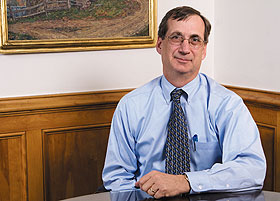  |
| HOME | THIS ISSUE | CALENDAR | GRANTS | BACK ISSUES | < BACK | NEXT > |
Dean says 21st century agriculture a complex scientific fieldby David Bauman - April 27, 2009
|
||||
| Just before Thanksgiving last year, Gregory Weidemann, the new dean of UConn’s College of Agriculture and Natural Resources, convened a gathering of all 130 members of the faculty. He described the get-together as a “great opportunity to welcome and meet with new members of the College family.” It is a telling gesture about how Weidemann has been winning his welcome at the College. “You can’t start to administer an organization until you get out and get a good feel for its culture,” says Weidemann. “I need to become part of the family before I begin making changes.” During his first nine months on the job, Weidemann has devoted much of his time to meeting with the faculty, staff, students, alumni, lawmakers, and other stakeholders in Connecticut’s agricultural sector. And he is getting rave reviews. “He couldn’t have started any better,” says Ian Hart, the College’s associate dean for research and advanced studies. Hart says the dean has traveled the state “six and a half days a week” to meet all the College’s constituencies. “This is the industry we support and they support us. He has pretty much met with everybody.” Cameron Faustman, the College’s associate dean for academic programs, says Weidemann is “doing just great,” despite beginning his tenure just as declining budgets imposed “incredible fiscal challenges on the entire University.” Faustman says that a bi-weekly blog the dean uses to communicate is “a great way to let everyone know what’s going on, how he operates, and that he’s approachable.” Land-grant mission As a faculty member in plant pathology at the University of Arkansas, Weidemann became a recognized international authority on plant pathogenic fungi. He also received several teaching awards. He headed the university’s Agricultural Experiment Station for seven years, and in 2002 was appointed as dean of the Dale Bumpers College of Agricultural, Food, and Life Sciences. Weidemann says the UConn College of Agriculture and Natural Resources continues to play a significant role in the University’s land-grant mission: “We have a firm commitment to research, education, and outreach to benefit the citizens, communities, and economic well-being of Connecticut.” He notes that there is widespread and growing interest in buying locally grown food, eating healthfully, developing green lifestyles, and ensuring the security of the food system. “This enthusiasm provides us a unique opportunity to help transform the state’s food sector,” he says.
Identifying priorities This focus is reflected in the new strategic plan he helped draft, which includes the goals of expanding undergraduate opportunities for study abroad, recruiting top graduate students, and boosting research in animal health, human nutrition, regenerative and developmental biology, plant biotechnology, horticulture, and land use planning. The College is also well positioned to play a leadership role in educating people about the complex path food takes from the farm to the fork, Weidemann says: “Your typical consumer doesn’t have any recognition when buying something in the grocery store how much science has gone into the product they’re purchasing.” Recent incidents of contaminants entering the U.S. food supply underscore how difficult it has become to guarantee food safety in today’s vast worldwide network of food producers, processors, and distributors, he adds. Students who specialize in 21st-century agriculture discover a complex, systemic, and scientific world that includes the study of soil microbes at a molecular level, how fertilizers affect soil, new drought- and disease-resistant seed varieties, diseases that affect crops and animals, the economics of food production, water management technologies, methods of food processing, and the well-being of urban, suburban, and rural communities, he says. “We’re dealing with perception,” he continues. “Talk about agriculture and people think you are teaching them how to farm. What we’re really doing is training students who become professionals dealing in specialized roles of the agri-food industry. “The business side of our food delivery system – food processing, manufacturing, distribution, retail, and regulation – is a very long chain that has professionals involved every step of the way.” Agriculture research can quickly be turned into prosperity and new job creation, because it is conducted cooperatively with local communities, farmers, growers, and educators through a network of extension services, he says. “It’s all about applying science to solve problems,” Weidemann adds. “There will always be agriculture in the state. It will look different, but we will continue to see agriculture evolve. And we want to be known in the state as a resource to help in that evolution.” |
| ADVANCE HOME UCONN HOME |

